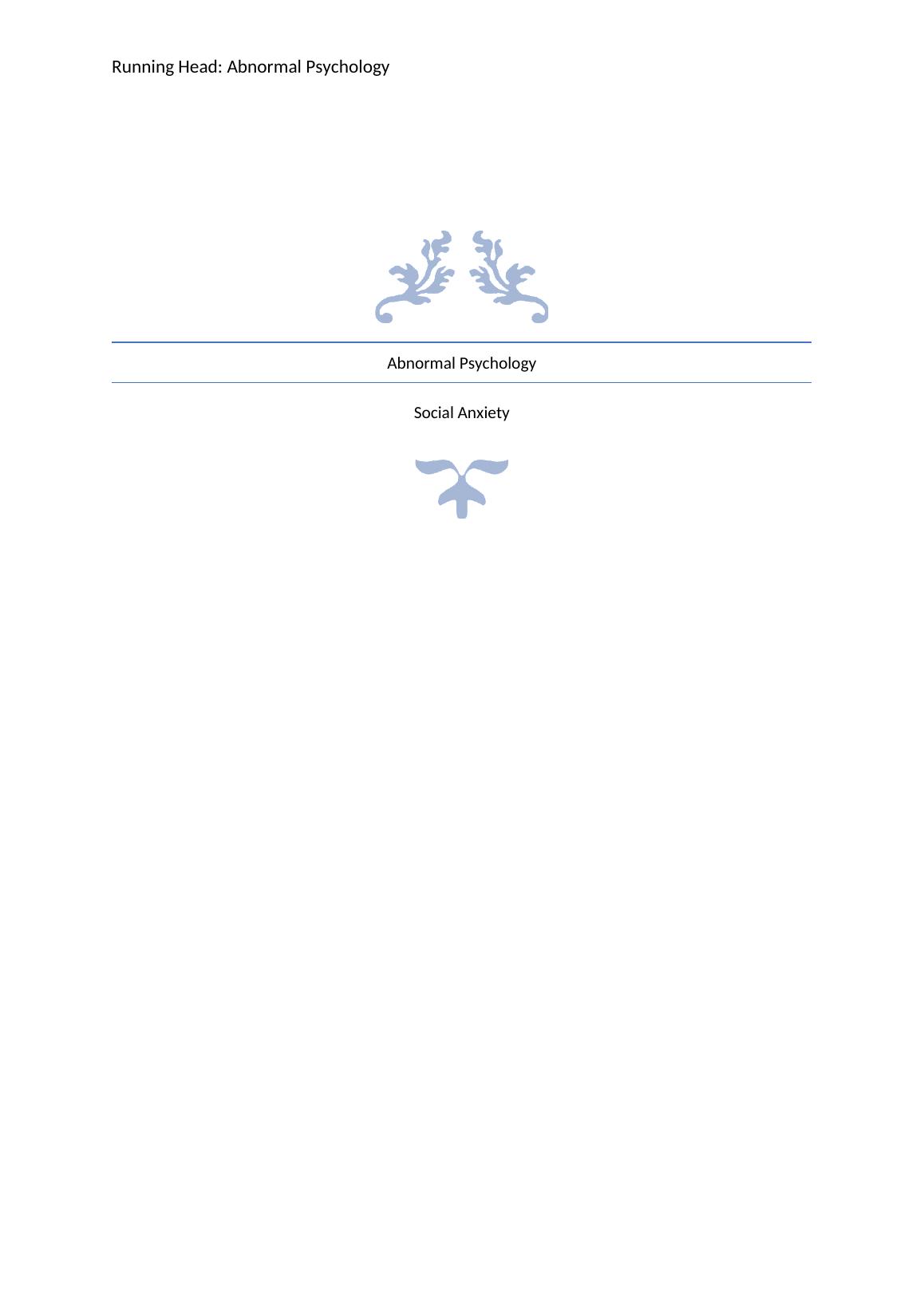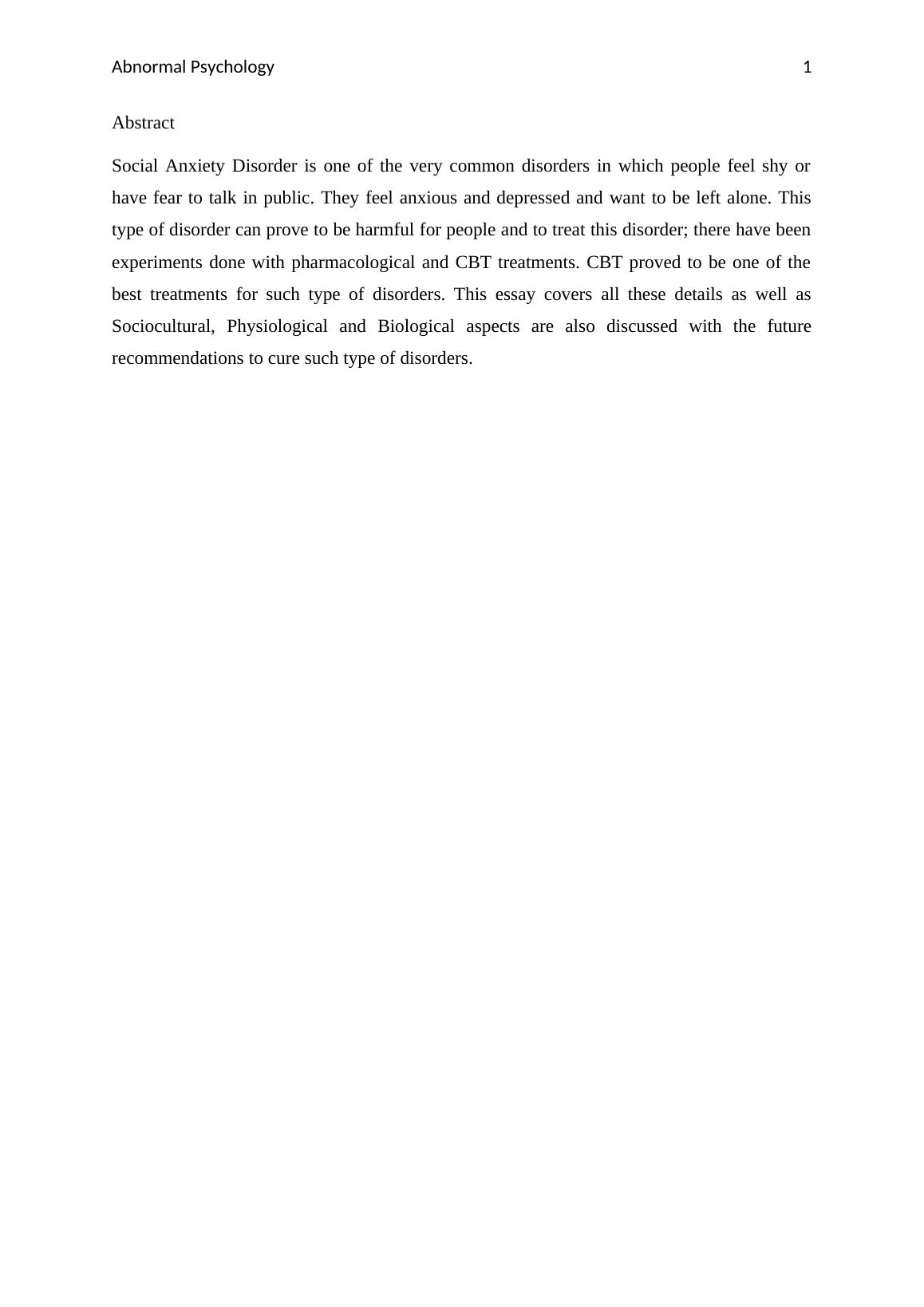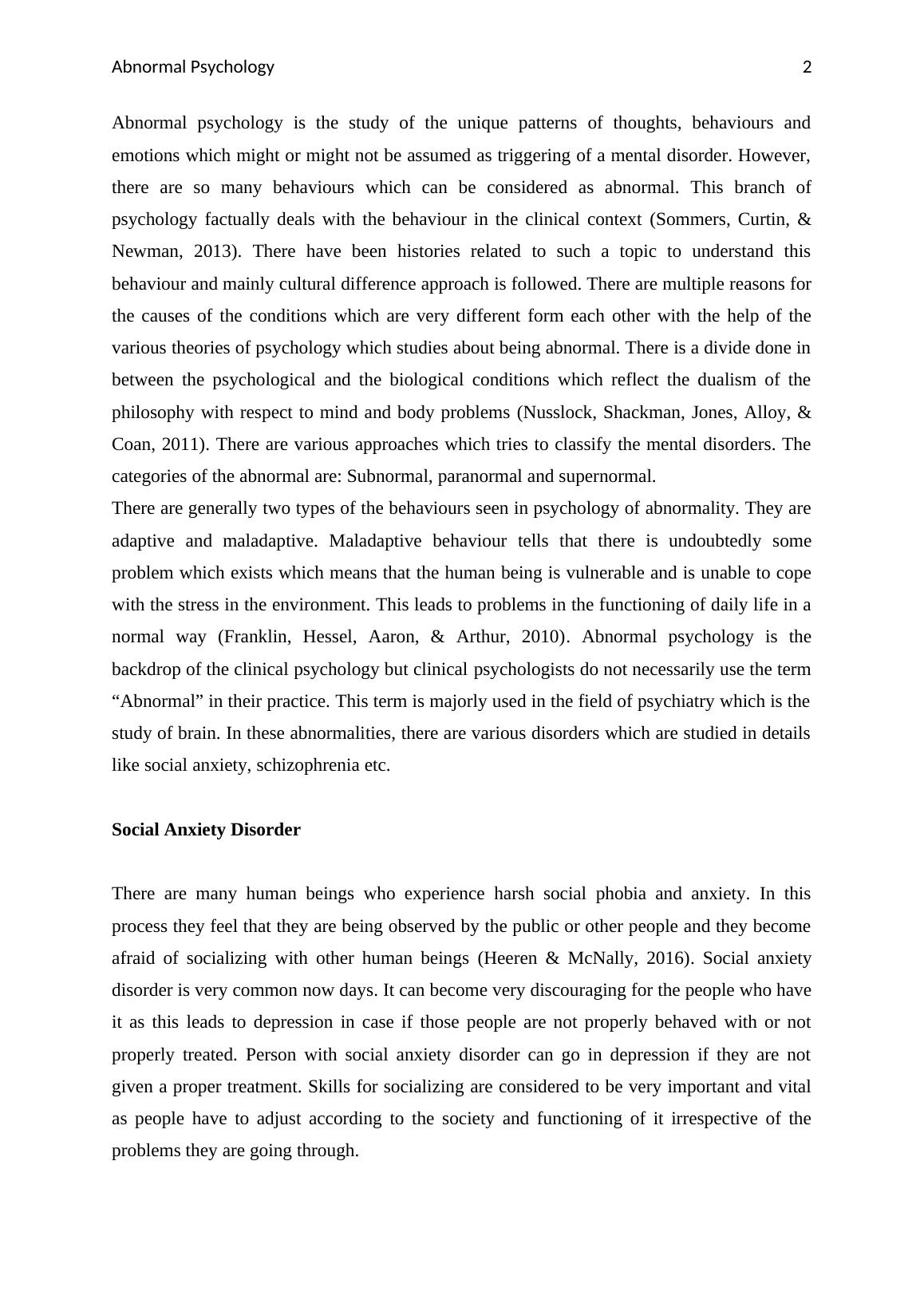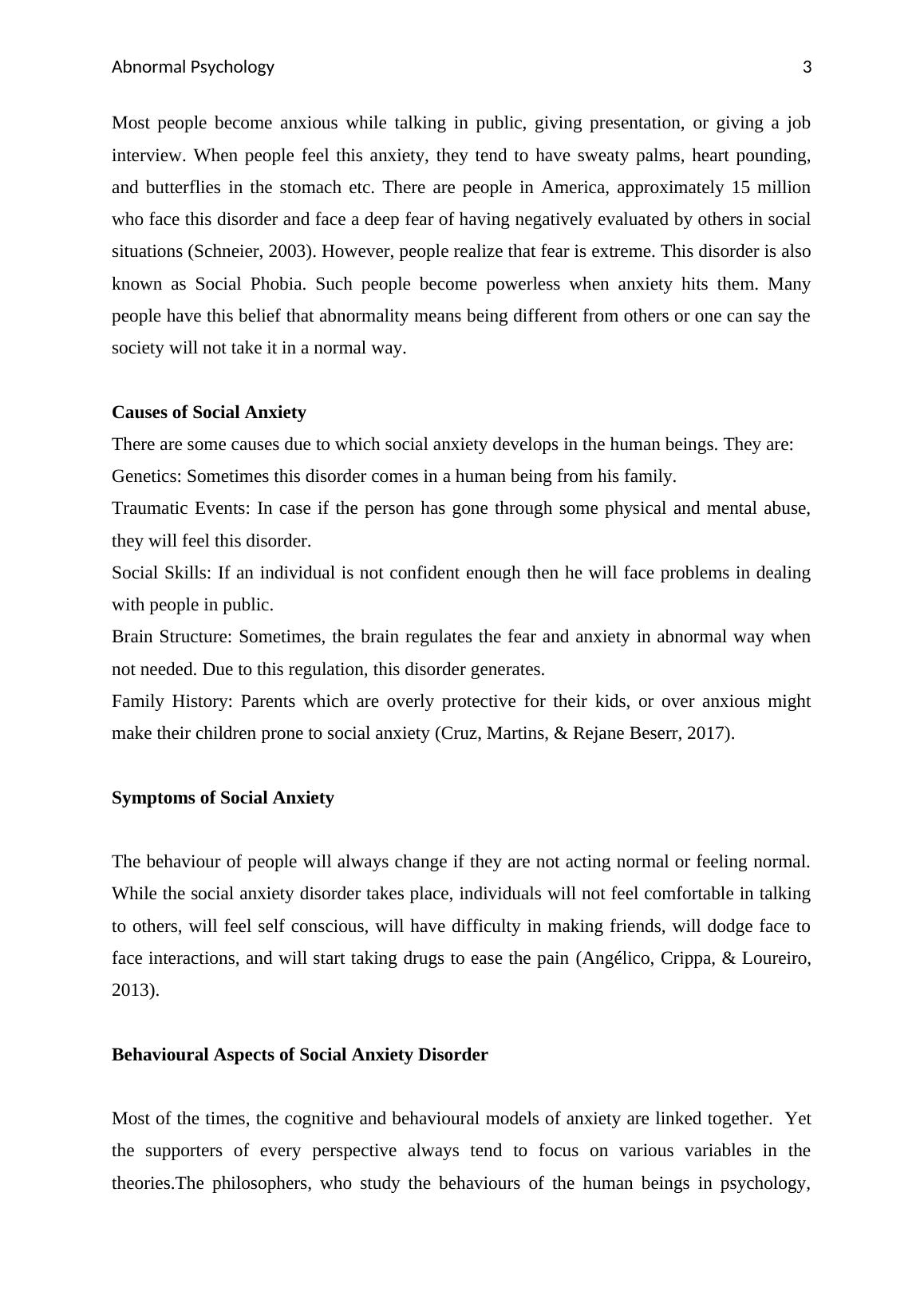Ask a question from expert
Introduction to Abnormal Psychology (doc)
14 Pages4467 Words72 Views
Added on 2021-05-30
Introduction to Abnormal Psychology (doc)
Added on 2021-05-30
BookmarkShareRelated Documents
Running Head: Abnormal PsychologyABNORMALPSYCHOLOGYSocial Anxiety

Abnormal PsychologyAbstractSocial Anxiety Disorder is one of the very common disorders in which people feel shy orhave fear to talk in public. They feel anxious and depressed and want to be left alone. Thistype of disorder can prove to be harmful for people and to treat this disorder; there have beenexperiments done with pharmacological and CBT treatments. CBT proved to be one of thebest treatments for such type of disorders. This essay covers all these details as well asSociocultural, Physiological and Biological aspects are also discussed with the futurerecommendations to cure such type of disorders. 1

Abnormal PsychologyAbnormal psychology is the study of the unique patterns of thoughts, behaviours andemotions which might or might not be assumed as triggering of a mental disorder. However,there are so many behaviours which can be considered as abnormal. This branch ofpsychology factually deals with the behaviour in the clinical context[ CITATION Som13 \l2057 ]. There have been histories related to such a topic to understand this behaviour andmainly cultural difference approach is followed. There are multiple reasons for the causes ofthe conditions which are very different form each other with the help of the various theoriesof psychology which studies about being abnormal. There is a divide done in between thepsychological and the biological conditions which reflect the dualism of the philosophy withrespect to mind and body problems[ CITATION Nus11 \l 2057 ]. There are various approacheswhich tries to classify the mental disorders. The categories of the abnormal are: Subnormal,paranormal and supernormal. There are generally two types of the behaviours seen in psychology of abnormality. They areadaptive and maladaptive. Maladaptive behaviour tells that there is undoubtedly someproblem which exists which means that the human being is vulnerable and is unable to copewith the stress in the environment. This leads to problems in the functioning of daily life in anormal way[ CITATION Fra10 \l 2057 ]. Abnormal psychology is the backdrop of the clinicalpsychology but clinical psychologists do not necessarily use the term “Abnormal” in theirpractice. This term is majorly used in the field of psychiatry which is the study of brain. Inthese abnormalities, there are various disorders which are studied in details like socialanxiety, schizophrenia etc. Social Anxiety DisorderThere are many human beings who experience harsh social phobia and anxiety. In thisprocess they feel that they are being observed by the public or other people and they becomeafraid of socializing with other human beings[ CITATION Hee16 \l 2057 ]. Social anxietydisorder is very common now days. It can become very discouraging for the people who haveit as this leads to depression in case if those people are not properly behaved with or notproperly treated. Person with social anxiety disorder can go in depression if they are notgiven a proper treatment. Skills for socializing are considered to be very important and vitalas people have to adjust according to the society and functioning of it irrespective of theproblems they are going through. 2

Abnormal PsychologyMost people become anxious while talking in public, giving presentation, or giving a jobinterview. When people feel this anxiety, they tend to have sweaty palms, heart pounding,and butterflies in the stomach etc. There are people in America, approximately 15 millionwho face this disorder and face a deep fear of having negatively evaluated by others in socialsituations[ CITATION Sch03 \l 2057 ]. However, people realize that fear is extreme. Thisdisorder is also known as Social Phobia. Such people become powerless when anxiety hitsthem. Many people have this belief that abnormality means being different from others or onecan say the society will not take it in a normal way.Causes of Social AnxietyThere are some causes due to which social anxiety develops in the human beings. They are:Genetics: Sometimes this disorder comes in a human being from his family. Traumatic Events: In case if the person has gone through some physical and mental abuse,they will feel this disorder. Social Skills: If an individual is not confident enough then he will face problems in dealingwith people in public. Brain Structure: Sometimes, the brain regulates the fear and anxiety in abnormal way whennot needed. Due to this regulation, this disorder generates. Family History: Parents which are overly protective for their kids, or over anxious mightmake their children prone to social anxiety[ CITATION Cru17 \l 2057 ]. Symptoms of Social AnxietyThe behaviour of people will always change if they are not acting normal or feeling normal.While the social anxiety disorder takes place, individuals will not feel comfortable in talkingto others, will feel self conscious, will have difficulty in making friends, will dodge face toface interactions, and will start taking drugs to ease the pain[ CITATION Ang13 \l 2057 ]. Behavioural Aspects of Social Anxiety DisorderMost of the times, the cognitive and behavioural models of anxiety are linked together. Yetthe supporters of every perspective always tend to focus on various variables in the3

End of preview
Want to access all the pages? Upload your documents or become a member.
Related Documents
Cognitive Behavioral Therapy Case Study 2022lg...
|8
|1976
|24
Cognitive Behavioural Therapy Essay 2022lg...
|6
|1658
|12
Treatment of Social Anxiety Disorders with the use of Cognitive Behavioural Therapylg...
|6
|1354
|281
Utility and Clinical Effectiveness of Cognitive Behavioural Therapy (CBT) in Treating Common Mental Disorderslg...
|12
|3383
|247
Psychological and Medical Models for Eating Disorders: A Case Study of Nikki Grahamelg...
|11
|741
|317
The Cognitive-behavioral therapylg...
|7
|1731
|17